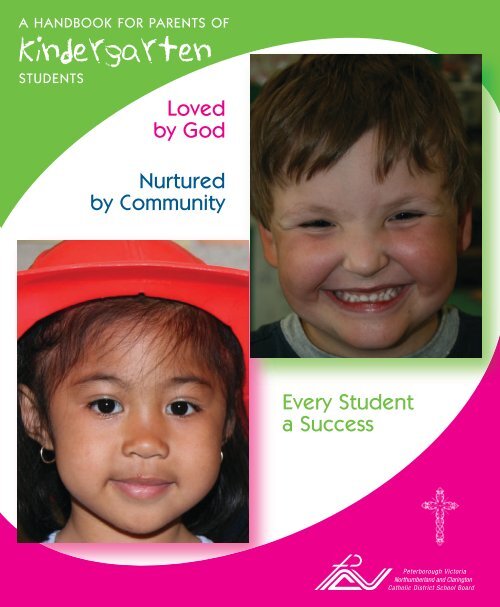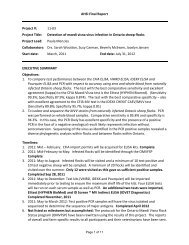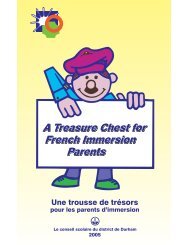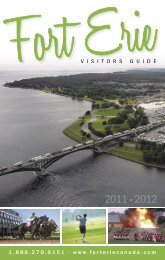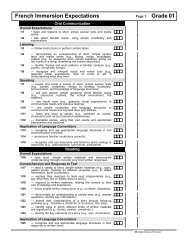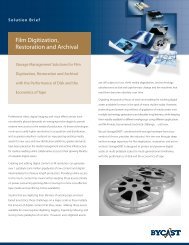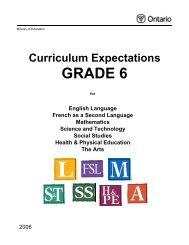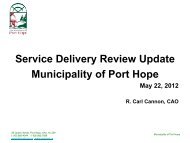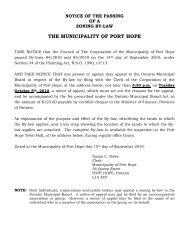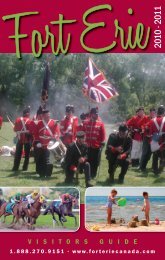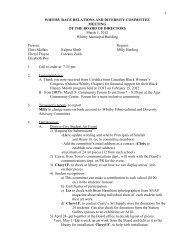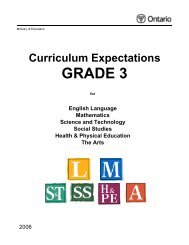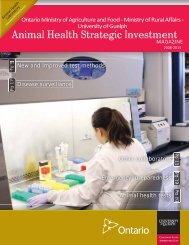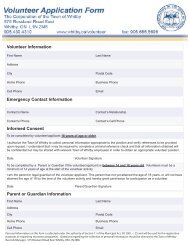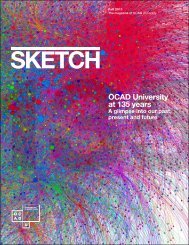Kindergarten - PVNC Catholic District School Board
Kindergarten - PVNC Catholic District School Board
Kindergarten - PVNC Catholic District School Board
Create successful ePaper yourself
Turn your PDF publications into a flip-book with our unique Google optimized e-Paper software.
A HANDBOOK FOR PARENTS OF<br />
<strong>Kindergarten</strong><br />
STUDENTS<br />
Loved<br />
by God<br />
Nurtured<br />
by Community<br />
Every Student<br />
a Success
Welcome<br />
to<br />
<strong>Kindergarten</strong>
Table of Contents<br />
Motto, Vision Statement, and Mission Statement . . . . . . . . . . . . . . . . . . . . . . . . . . . . . . . . . . . . . . . . . . . . . . . 1<br />
Guiding Principles . . . . . . . . . . . . . . . . . . . . . . . . . . . . . . . . . . . . . . . . . . . . . . . . . . . . . . . . . . . . . . . . . . . . . . . . . . . . . . . . . . . . 2<br />
Ontario Graduate Expectations . . . . . . . . . . . . . . . . . . . . . . . . . . . . . . . . . . . . . . . . . . . . . . . . . . . . . . . . . . . . . . . . . . . . . 3<br />
Welcome from the Director of Education . . . . . . . . . . . . . . . . . . . . . . . . . . . . . . . . . . . . . . . . . . . . . . . . . . . . . . . . . 4<br />
Entrance Requirements & Registration Information . . . . . . . . . . . . . . . . . . . . . . . . . . . . . . . . . . . . . . . . . . . 5-6<br />
Safety & Transportation . . . . . . . . . . . . . . . . . . . . . . . . . . . . . . . . . . . . . . . . . . . . . . . . . . . . . . . . . . . . . . . . . . . . . . . . . . . . . . 6<br />
Good Health Habits . . . . . . . . . . . . . . . . . . . . . . . . . . . . . . . . . . . . . . . . . . . . . . . . . . . . . . . . . . . . . . . . . . . . . . . . . . . . . . . . . . 7<br />
Parents Can Help . . . . . . . . . . . . . . . . . . . . . . . . . . . . . . . . . . . . . . . . . . . . . . . . . . . . . . . . . . . . . . . . . . . . . . . . . . . . . . . . . . . . . 7<br />
The <strong>Kindergarten</strong> Years . . . . . . . . . . . . . . . . . . . . . . . . . . . . . . . . . . . . . . . . . . . . . . . . . . . . . . . . . . . . . . . . . . . . . . . . . . 8-10<br />
The Home & <strong>School</strong> Partnership . . . . . . . . . . . . . . . . . . . . . . . . . . . . . . . . . . . . . . . . . . . . . . . . . . . . . . . . . . . . . 11-13<br />
Learning Through Play . . . . . . . . . . . . . . . . . . . . . . . . . . . . . . . . . . . . . . . . . . . . . . . . . . . . . . . . . . . . . . . . . . . . . . . . . . . . . 14<br />
Religious & Family Life Education . . . . . . . . . . . . . . . . . . . . . . . . . . . . . . . . . . . . . . . . . . . . . . . . . . . . . . . . . . . . . . . . . 15<br />
Communication & Reporting . . . . . . . . . . . . . . . . . . . . . . . . . . . . . . . . . . . . . . . . . . . . . . . . . . . . . . . . . . . . . . . . . . 16-19<br />
Transportation Services . . . . . . . . . . . . . . . . . . . . . . . . . . . . . . . . . . . . . . . . . . . . . . . . . . . . . . . . . . . . . . . . . . . . . . . . . . . . 20<br />
French Immersion . . . . . . . . . . . . . . . . . . . . . . . . . . . . . . . . . . . . . . . . . . . . . . . . . . . . . . . . . . . . . . . . . . . . . . . . . . . . . . . 21-23<br />
I’m Glad You Asked . . . . . . . . . . . . . . . . . . . . . . . . . . . . . . . . . . . . . . . . . . . . . . . . . . . . . . . . . . . . . . . . . . . . . . . . . . . . . . . . . 24<br />
How to Find Out More . . . . . . . . . . . . . . . . . . . . . . . . . . . . . . . . . . . . . . . . . . . . . . . . . . . . . . . . . . . . . . . . . . . . . . . . . . . . . 25<br />
Prayer . . . . . . . . . . . . . . . . . . . . . . . . . . . . . . . . . . . . . . . . . . . . . . . . . . . . . . . . . . . . . . . . . . . . . . . . . . . . . . . . . . . . . . . . . . . . . . . . . 26<br />
Directory of <strong>School</strong>s . . . . . . . . . . . . . . . . . . . . . . . . . . . . . . . . . . . . . . . . . . . . . . . . . . . . . . . . . . . . . . . . . . . . . . . . . . . . . . . . 27<br />
A Poem to Parents . . . . . . . . . . . . . . . . . . . . . . . . . . . . . . . . . . . . . . . . . . . . . . . . . . . . . . . . . . . . . . . . . . . . . . . . . . . . . . . . . . 28
Our mission statement, vision statement,<br />
and guiding principles govern our plans and our decisions as an organization.<br />
Motto<br />
Imparting the Spirit Through Education<br />
Vision Statement<br />
Our entire educational community will take<br />
responsibility for <strong>Catholic</strong> education.<br />
Mission Statement<br />
To provide all students with a <strong>Catholic</strong> education that includes the knowledge,<br />
skills, and values required to live a meaningful and faith filled life.<br />
1
Guiding Principles<br />
1. We will live the Christian message and promote the cause of <strong>Catholic</strong> education.<br />
We are responsible for sharing the Gospel message and promoting <strong>Catholic</strong> education. This<br />
principle emphasizes the service role that we have in our school communities as well as the<br />
responsibility we have of developing and maintaining a hospitable, compassionate, and<br />
understanding environment.<br />
2. We will ensure that students come first.<br />
All individuals and departments supporting the mission of the<br />
Separate <strong>School</strong> <strong>Board</strong> must identify objectives and strategies<br />
that enhance the quality of education and services. <strong>Board</strong><br />
Policies and <strong>Board</strong> Plans can serve as a starting point to help<br />
individuals and departments identify specific objectives and<br />
strategies. Consider, for example, the Safe <strong>School</strong>s Policy, the<br />
Special Education Plan, the Medication Policy, Health and Safety<br />
Policies, etc.<br />
3. We will operate effectively.<br />
We are responsible for examining the organizational structure, and initiating and supporting<br />
changes to improve effectiveness. We are equally responsible and accountable for the financial<br />
and material resources at our disposal.<br />
4. We will develop and maintain alliances.<br />
We have individual and group responsibilities to develop partnerships. We need to identify<br />
potential partners and work with them for the greater good of the community.<br />
5. We will communicate effectively.<br />
We have a responsibility to invite participation and feedback, and to keep people informed.<br />
6. We will be responsible for personal renewal.<br />
Personal renewal refers to taking control of our physical, social, spiritual, and mental well-being.<br />
We have an individual responsibility for staying abreast of developments in our field of work.<br />
(Activities include reading, applying the concepts that we read about, taking courses, attending<br />
conferences, becoming mentors, trying something new, initiating/participating on<br />
work/discussion groups.)<br />
2
Ontario <strong>Catholic</strong><br />
Graduate Expectations<br />
The Ontario <strong>Catholic</strong> Graduate is expected to be:<br />
1. A discerning believer formed in the <strong>Catholic</strong> Faith community who<br />
celebrates the signs and sacred mystery of God’s presence through word,<br />
sacrament, prayer, forgiveness, reflection and moral living.<br />
2. An effective communicator who speaks, writes, and listens honestly and<br />
sensitively, responding critically in light of gospel values.<br />
3. A reflective, creative and holistic thinker<br />
who solves problems and makes<br />
responsible decisions with an<br />
informed moral conscience for<br />
the common good.<br />
4. A self-directed, responsible,<br />
lifelong learner who develops<br />
and demonstrates their God-given<br />
potential.<br />
5. A collaborative contributor who finds meaning, dignity and vocation in<br />
work which respects the rights of all and contributes to the common good.<br />
6. A caring family member who attends to family, school, parish, and the<br />
wider community.<br />
7. A responsible citizen who gives witness to <strong>Catholic</strong> social teaching by<br />
promoting peace, justice and the sacredness of human life.<br />
3
Welcome<br />
The lunch has been made, and the backpack has been packed<br />
for weeks! It's only 8:00 a.m., but your child is itching to head for<br />
the bus stop. You can't help feeling a little excited, too, as your<br />
child prepares for her first day of <strong>Kindergarten</strong>.<br />
Young, active minds take delight in exploration and discovery as<br />
the world unfolds before them.<br />
The first day of <strong>Kindergarten</strong> is an exciting time for you and your<br />
child.<br />
It's also an exciting time for all of us who work at the Peterborough Victoria<br />
Northumberland and Clarington <strong>Catholic</strong> <strong>District</strong> <strong>School</strong> <strong>Board</strong>.<br />
Jesus once said,<br />
"Let the little children come to me; do not stop them;<br />
for it is to such as these that the Kingdom of God belongs."<br />
(MARK 10:14)<br />
We consider it a privilege to be able to nurture the children who pass through our system,<br />
and to help them to grow physically, socially, emotionally, spiritually, and intellectually. We<br />
look forward to getting to know you and your child during the upcoming weeks, and to<br />
working with you to ensure that your child's first years of school provide the foundation for<br />
a life-long love of learning.<br />
John Mackle<br />
DIRECTOR OF EDUCATION<br />
Peterborough Victoria Northumberland<br />
and Clarington <strong>Catholic</strong> <strong>District</strong> <strong>School</strong> <strong>Board</strong><br />
4
Entrance Requirements<br />
& Registration Information<br />
This information will assist parents of <strong>Kindergarten</strong> children who are starting<br />
school.<br />
If you are not sure which school your child should attend, call the<br />
Purchasing, Planning, and Facility Administration Department at (705) 748-4861.<br />
KINDERGARTEN ENTRANCE REQUIREMENTS<br />
Junior <strong>Kindergarten</strong><br />
Children must be four years of age on or before December 31 of the current<br />
school year.<br />
Senior <strong>Kindergarten</strong><br />
Children must be five years of age on or before December 31 of the current<br />
school year.<br />
Registration<br />
Registration usually takes place in early November, although it can occur anytime<br />
during the school year.<br />
5
When you come to register for <strong>Kindergarten</strong> please bring:<br />
1. Proof of your child’s age; any one of the following –<br />
Birth Certificate, Passport, Immigration papers.<br />
2. Baptismal Certificate.<br />
3. Immunization Record.<br />
4. Your name, address (lot and concession number for rural students), and<br />
telephone number – and the telephone number where you can be contacted in<br />
case of an emergency.<br />
5. Name and address of your babysitter or day care if your child will spend part of<br />
the day at day care.<br />
6. Other documentation regarding your child’s needs if applicable, i.e. special<br />
education reports.<br />
7. Be ready to inform school personnel about any medical conditions that your<br />
child may have and/or any medication requirements, i.e. allergic reactions.<br />
Safety & Transportation<br />
Help your child by planning the safest route to and from school.<br />
Help familiarize your child with the route. Help your child to learn to:<br />
❁ Walk on the sidewalk;<br />
❁ Cross the street only at corners, crosswalks, traffic lights or where there is a<br />
guard or safety patrol;<br />
❁ Stop, look both ways and listen before crossing the road;<br />
❁ Listen to the guard, police officer, or safety patroller;<br />
❁ Recognize Block Parent signs.<br />
If possible, walk your child to school or arrange for them to walk with<br />
other children.<br />
6
Good Health Habits<br />
❁ Encourage your child to eat a nourishing meal before coming to school and at<br />
every mealtime.<br />
❁ Ensure that your child gets enough rest. Most children need from ten to twelve<br />
hours of sleep a night.<br />
❁ Ensure that your child wears clothing that is appropriate for the time of year<br />
and can be easily managed.<br />
❁ Teach your child to be responsible for using the bathroom, washing hands and<br />
face, cleaning teeth, and dressing.<br />
❁ Encourage your child to play outside every day.<br />
Parents Can Help<br />
❁ Choose books from the local Public Library so that your child becomes familiar<br />
with books.<br />
❁ Read stories and nursery rhymes, and sing songs<br />
with your child as often as possible.<br />
❁ Take your child to the store, the park, the zoo<br />
and other activities outside the home. Talk<br />
about these activities with your child.<br />
❁ Respond to your child’s questions honestly<br />
and with comments and explanations.<br />
❁ Choose carefully a few television programs<br />
for your child to watch.<br />
❁ Encourage responsibility and sharing in and<br />
around the home.<br />
7
The <strong>Kindergarten</strong> Years<br />
The <strong>Kindergarten</strong> years are a time of tremendous growth for young children –<br />
a time in which they grow physically, socially, emotionally, spiritually,<br />
and intellectually.<br />
During the <strong>Kindergarten</strong> years, your child will learn how to ...<br />
❁ celebrate the many gifts that God has given to us in creation, in ourselves, and<br />
in each other;<br />
❁ work alone and with others;<br />
❁ explore and expand his/her abilities and interests;<br />
❁ listen to and share with others;<br />
❁ begin simple problem-solving;<br />
❁ develop responsibility for selecting and caring<br />
for materials;<br />
❁ express his/her thoughts and ideas.<br />
He or she will participate in activities<br />
designed to ...<br />
❁ build self-confidence;<br />
❁ show differences in sound, shape, and colour;<br />
❁ improve co-ordination, stability, locomotion,<br />
and manipulation;<br />
❁ develop vocabulary;<br />
❁ increase interest in books, numbers, and people;<br />
❁ introduce new ideas.<br />
8
STAGGERED ENTRY<br />
Staggered entry means that not all of the children in the Junior <strong>Kindergarten</strong><br />
program attend on the first day of school in September. The children enter school<br />
in small groups.<br />
For your child, it means a calm and<br />
warm introduction to Junior<br />
<strong>Kindergarten</strong>. The teacher can give<br />
each student more personal attention<br />
on this important first day. This<br />
approach helps students who arrive<br />
with a variety of cultural and social<br />
backgrounds, preschool experiences,<br />
and special needs.<br />
Your child will experience a sense of<br />
belonging, and a more relaxed<br />
introduction to school expectations and<br />
routines, and the classroom<br />
environment.<br />
For Senior <strong>Kindergarten</strong> students who<br />
did not attend Junior <strong>Kindergarten</strong>, a<br />
staggered entry day may be provided.<br />
A full-day, alternate day format is used<br />
for both Junior <strong>Kindergarten</strong> and Senior<br />
<strong>Kindergarten</strong>.<br />
9
A TYPICAL KINDERGARTEN DAY INCLUDES THE<br />
FOLLOWING TYPES OF ACTIVITIES<br />
Circle Time:<br />
a time for shared group activities such as storytelling, the teaching of a<br />
lesson, or a group discussion about a concept from the religious program.<br />
Activity Centres:<br />
children participate in centres focussing on art, literacy, numeracy,<br />
and so on.<br />
Free Play:<br />
children have the opportunity to explore areas of particular interest<br />
(i.e. sand and water tables, dramatic play, blocks, and puzzles).<br />
Gym and Outdoor Play:<br />
children enjoy much-needed opportunities to move their bodies and<br />
practise gross motor skills such as running, jumping, hopping, and climbing.<br />
Library:<br />
children are able to choose books to bring home to enjoy with their parents,<br />
and begin to learn about accessing information using all the resources<br />
available in the school library.<br />
Lunch and Snack Times:<br />
students are supervised in the classroom by a teacher, an educational<br />
assistant, or an adult lunch supervisor.<br />
Literacy Activities:<br />
these activities include rhymes, finger plays, songs, stories, poems, sound<br />
and letter recognition.<br />
Numeracy Activities:<br />
these activities promote mathematical thinking and encourage a positive<br />
disposition towards mathematics. Activities include counting, looking for<br />
patterns, sorting, measuring and collecting data.<br />
10
The Home & <strong>School</strong> Partnership<br />
Parents have an important role to play in their children's success at school. What<br />
follows are a few ideas about what you can do to make your child's <strong>Kindergarten</strong><br />
years a positive experience for all concerned.<br />
You can help to ease your child's transition to school by ...<br />
Teaching your child how to take care of his/her personal needs.<br />
Your child will feel more comfortable in the school setting if he/she has learned:<br />
❁ the route to and from school, and his/her teacher's name;<br />
❁ how to put on shoes and outdoor clothing independently;<br />
❁ how to use the bathroom and wash his/her hands independently;<br />
❁ his/her address and phone number;<br />
❁ how to keep track of personal property;<br />
❁ how to independently open/close his/her backpack and lunch/snack<br />
containers.<br />
Introduction to the teacher, the classroom, and to classmates is gradual and<br />
comfortable.<br />
Ensuring that your child is in the best possible physical health.<br />
Your child will be more likely to join in the fun if he/she:<br />
❁ gets plenty of rest (ideally 10 to 12 hours per night);<br />
❁ eats a good variety of healthy foods, especially at breakfast;<br />
❁ gets up in plenty of time for school so that he/she doesn't have to hurry<br />
unnecessarily, and is wide awake by the time school starts;<br />
❁ wears comfortable clothing that is designed for active play, and that he/she can<br />
unzip or unbutton with minimal assistance.<br />
11
Encouraging your child's love of learning and helping<br />
him/her to develop basic academic skills.<br />
Your child will be more willing to participate in<br />
classroom activities if he/she feels confident of<br />
success. You can help your child to be successful at<br />
school by:<br />
❁ talking about school in a positive way, so that<br />
your child will think of it as a happy place;<br />
❁ displaying your child's schoolwork proudly,<br />
and praising all his/her school efforts;<br />
❁ ensuring consistent attendance and punctuality;<br />
❁ encouraging your child to talk about experiences and express opinions;<br />
❁ reading to your child daily and telling him/her stories;<br />
❁ providing a selection of materials for play at home (i.e. glue, pencils, markers,<br />
paints, playdough, scissors, crayons, and scrap materials such as wood, paper<br />
towel rolls, and boxes) as well as a place to use these materials;<br />
❁ allowing your child to practise his/her counting skills (i.e. counting money,<br />
crackers, toys, etc.);<br />
❁ making everyday activities (i.e. grocery shopping, cooking, cleaning, driving in<br />
the car) sources of learning;<br />
❁ understanding that children grow at different rates, and be patient with your<br />
child if he/she is slow to acquire a particular skill;<br />
❁ encouraging your child to use his/her senses – smelling, hearing, seeing,<br />
tasting and touching.<br />
12
You can help your child's teacher by ...<br />
❁ keeping your child home from school if he/she is ill (i.e. upset stomach, runny<br />
nose, fever, or sore throat);<br />
❁ notifying your child's school (or the designated safe arrival volunteer for your<br />
child's classroom) if your child is going to be absent from school;<br />
❁ providing the teacher with written instructions if there is to be any change to<br />
your child's regular routine (i.e. if you will be picking up your child instead of<br />
having him/her take the bus, or if your child will be going home with a friend<br />
after school);<br />
❁ ensuring that your child arrives at school on time, and that he/she is properly<br />
supervised until the start of the school day;<br />
❁ labelling all of your child's personal possessions;<br />
❁ sending your child's lunch and snacks in carefully-labelled and easy to open<br />
containers;<br />
❁ providing your child with a backpack that is large enough to accommodate a<br />
lunch bag, snacks, library books, artwork, extra<br />
mittens, and notes from your child's teacher;<br />
❁ providing your child with clean indoor shoes that<br />
he/she can wear at school;<br />
❁ checking your child's backpack daily for notes from<br />
your child's teacher, and returning forms and other<br />
important documents as promptly as possible;<br />
❁ sharing information with your child's teacher on an<br />
ongoing basis;<br />
❁ encouraging your child to follow school rules<br />
regarding clothing, money, and supplies;<br />
❁ arranging a time prior to the beginning of class time or after class is dismissed<br />
to discuss your concerns or to obtain answers to any questions you may have.<br />
13
Learning Through Play<br />
<strong>Kindergarten</strong>-aged children do much of<br />
their learning through play. Play is as<br />
natural to a child's mind and spirit as food<br />
and drink is to his or her body. Every child<br />
has a powerful inner drive to explore,<br />
experiment, and discover. A child can no<br />
more be stopped from learning through<br />
play than he or she can be stopped from<br />
growing.<br />
Children explore, ask questions, and play<br />
as a way of learning about their world.<br />
Play in the classroom IS<br />
❁ the child's attempt to recreate experience in order to understand and<br />
master it;<br />
❁ a self-directed activity with a purpose that may not be immediately apparent to<br />
the observer;<br />
❁ an activity with self-imposed rules that change frequently;<br />
❁ an activity that develops both the child's emotions and thinking powers;<br />
❁ a place to learn how to interact in socially acceptable ways;<br />
❁ the child's means of learning language;<br />
❁ the place where the child learns through experience about intellectual<br />
operations which cannot be directly taught;<br />
❁ where the child learns concepts and skills;<br />
❁ where the child learns about his or her own capabilities.<br />
14
Religious Education<br />
&<br />
Family Life Programs<br />
The Religion program helps children<br />
grow as believers in God and Jesus,<br />
and as faithful members of the<br />
<strong>Catholic</strong>-Christian community.<br />
Students from Junior <strong>Kindergarten</strong> to<br />
Grade 12 are taught through a<br />
learning cycle involving real-life<br />
experience, information, action and<br />
application. The program supports<br />
and enhances the values and the<br />
education in faith that are a part of<br />
the child’s family at home. Focusing<br />
on the inter-woven themes of<br />
scripture, profession of faith,<br />
sacramental life, prayer and Christian<br />
moral development, the Christian<br />
spirit permeates the entire curriculum<br />
and daily life of our <strong>Catholic</strong> schools.<br />
Religious Education<br />
&<br />
Family Life Programs<br />
The Family Life program instills<br />
Christian values based on the dignity<br />
of all persons. Its focus is on<br />
developing good family and personal<br />
relationships, healthy sexual attitudes<br />
and a commitment to making a<br />
positive contribution to the community<br />
and the world.<br />
15
Communication<br />
&<br />
Reporting<br />
PARENTS AND TEACHERS WORK TOGETHER<br />
❁ Parents may arrange an interview with the teacher at any time during the year.<br />
❁ If there is a particular concern at any time, please do not hesitate to telephone<br />
and discuss it with your child’s teacher.<br />
❁ If your child’s teacher has a particular concern, he/she will contact the parents.<br />
❁ Interview and visits to the classroom occur during the school year and are<br />
arranged at times convenient for both teacher and parent, day or evening.<br />
❁ A progress report is completed at the end of the<br />
school year.<br />
ASSESSMENT AND EVALUATION<br />
In Junior <strong>Kindergarten</strong> and Senior <strong>Kindergarten</strong>,<br />
observations are the key way in which a teacher evaluates<br />
a child's growth. Early and ongoing assessment strategies<br />
are used throughout the <strong>Kindergarten</strong> years. The teacher<br />
provides verbal reports for the first term. The second and<br />
final reports are a written outline of the year's program.<br />
16
MEETING SPECIAL NEEDS<br />
The Peterborough Victoria Northumberland and Clarington <strong>Catholic</strong> <strong>District</strong> <strong>School</strong><br />
<strong>Board</strong> is fully committed to meeting the needs of exceptional students. The <strong>Board</strong><br />
believes that special needs students and their classmates benefit equally from<br />
policies promoting integration.<br />
<strong>Board</strong> policies concerning special needs students are designed to promote<br />
acceptance, enhance self-esteem, encourage mutual support and understanding,<br />
and increase interactive skills. Our school communities foster a sense of belonging,<br />
create a welcoming environment for all, and promote a sense of responsibility<br />
towards others.<br />
EARLY IDENTIFICATION OF CHILDREN’S LEARNING NEEDS<br />
Purpose<br />
The purpose of Early Identification is to provide an opportunity for the teacher to<br />
identify the learning needs of each child and to develop an educational<br />
environment that will meet those needs. By sharing information, the parents,<br />
teacher, principal and resource personnel gain a better understanding of each<br />
child’s capabilities and are better able to establish realistic expectations for<br />
each child.<br />
17
EARLY IDENTIFICATION PROCEDURES<br />
The Early Identification procedures for each child begin with Junior <strong>Kindergarten</strong><br />
registration, and continue through the <strong>Kindergarten</strong> year. Parents are informed of<br />
their child’s progress at various stages during the Early Identification procedure.<br />
Information related to each child’s development is collected and the skills he or she<br />
develops are recorded. The procedures consist of the following four components:<br />
❁ Information gathering and discussion with parents;<br />
❁ Observation and ongoing assessment;<br />
❁ Information sharing between teacher and Special Education Resource Teacher;<br />
❁ Appropriate intervention and identification, if necessary.<br />
THE JUNIOR KINDERGARTEN YEAR<br />
During the early part of the school year, the teacher meets with the parents to<br />
discuss the child’s development and early experiences. Parents are encouraged to<br />
contribute to their child’s success at school by sharing any information that might<br />
assist the classroom teacher in preparing a program for that child (i.e. information<br />
about physical or medical concerns). At this initial meeting, the parents can discuss<br />
any concerns they might have about their child’s entry into school.<br />
18
THE SENIOR KINDERGARTEN YEAR<br />
At the start of the school year, the teacher assesses the child’s level of<br />
development, individual learning style, and learning needs. The child’s progress is<br />
monitored on an ongoing basis throughout the school year.<br />
EARLY IDENTIFICATION IN THE<br />
<strong>PVNC</strong> CATHOLIC DISTRICT SCHOOL BOARD<br />
Within our <strong>Board</strong>, Early Identification is centered on the teacher’s observations of<br />
each child. The teacher is in a unique position to observe the child in a variety of<br />
situations, and to assess the child’s individual development and learning needs in<br />
many different areas. A <strong>School</strong> Resource Team provides support and consultation<br />
for the teacher to assist each child. Additional special education support staff from<br />
the Education Centre are also available to help when called upon. Students with<br />
special needs may receive resource help and could be considered for identification<br />
as an exceptional student.<br />
By understanding the way in which each child learns, the teacher will be able to<br />
structure and change the basic program to ensure that the needs of all are met<br />
during the critical first few years at school. Together parents, teachers and support<br />
staff work to provide a program that meets the individual needs of each child.<br />
19
Transportation Services<br />
Transportation to and from school for all eligible students is provided by the <strong>Board</strong><br />
as a privilege and is not a requirement. Parents, students and the <strong>Board</strong> share the<br />
responsibility for transportation to and from school. Parents are responsible for<br />
their child’s behavior and/or any damage caused to the bus or property of others.<br />
Junior <strong>Kindergarten</strong> to Grade 3 students who live beyond 1.0 km of their school<br />
and Grade 4 to 8 students who are beyond 1.6 km are eligible for transportation.<br />
Distance is measured along maintained roads, sidewalks and walkways. The<br />
school bus is similar to the classroom and students need to behave as they would<br />
in a classroom and obey the driver as they would a teacher. Generally, the<br />
guideline for maximum time on a bus is one hour in one direction. In order to<br />
ensure the safety of students, bus pick-ups and drop-offs must be consistent and<br />
at the same location every school day. Families will be contacted by the bus driver<br />
or bus company prior to the first day of school concerning stop location and pickup/drop-off<br />
times. The <strong>Board</strong> offers a “First Rider” program in late August where<br />
students have the opportunity to learn about bussing procedures, bus safety and<br />
take their first ride on a school bus. Dates will be published in the media for this<br />
event. Students are offered training at their school in the early-Fall and early-Spring<br />
to enhance their understanding of school bus safety.<br />
Further information on busing and student transportation can be obtained by<br />
contacting the <strong>Board</strong>’s Transportation Department.<br />
20
French Immersion<br />
The aim of the French Immersion program is to provide students with the skills<br />
they need to communicate in a second language. It enables students to develop<br />
strong fundamental skills in oral communication (listening and speaking), reading<br />
and writing as well as providing students with an understanding of the cultures of<br />
French speaking societies by integrating cultural study into daily language<br />
instruction.<br />
French Immersion programs are offered beginning at the Senior <strong>Kindergarten</strong> level<br />
and continuing through to Grade 12.<br />
The following identifies the percentage of language instruction at the different grade<br />
levels:<br />
GRADE FRENCH ENGLISH<br />
K-1 90% 10%<br />
2 80% 20%<br />
3-5 70% 30%<br />
6 55% 45%<br />
7-8 50% 50%<br />
In secondary school, a student will continue to take a selection of courses in<br />
French. In total, a student must accumulate a minimum of 10 courses taught in the<br />
French language. Students may become functionally fluent in French by the end of<br />
Grade 12, and are awarded with a certificate upon graduation.<br />
21
Programs are available at the following French Immersion <strong>School</strong>s:<br />
FRENCH IMMERSION SCHOOLS<br />
Elementary <strong>School</strong>s City Phone<br />
St. Anne’s Peterborough (705) 742-3342<br />
St. Catherine Peterborough (705) 742-6109<br />
St. Joseph’s Bowmanville (905) 623-5151<br />
St. Michael’s Cobourg (905) 372-4391<br />
Notre Dame Cobourg (905) 377-9967<br />
St. Dominic Lindsay (705) 878-3660<br />
Secondary <strong>School</strong>s<br />
St. Peter’s Peterborough (705) 745-1358<br />
St. Mary’s Cobourg (905) 372-4339<br />
St. Stephen’s Bowmanville (905) 623-3990<br />
TRANSPORTATION FOR FRENCH IMMERSION STUDENTS<br />
Transportation to the appropriate French Immersion school is provided for students<br />
who do not live within walking distance of the French Immersion school. The<br />
minimum walking distances are in accordance with the <strong>Board</strong> Policy.<br />
22
REGISTRATION FOR FRENCH IMMERSION<br />
If you intend to enroll your child in French Immersion, register your child at the<br />
appropriate French Immersion school. Parents who intend to enroll their child(ren)<br />
in French Immersion in Senior <strong>Kindergarten</strong> may register their child(ren) at the<br />
French Immersion school in Junior <strong>Kindergarten</strong> if space permits.<br />
ADDITIONAL NOTES FOR FRENCH IMMERSION<br />
1. Information evenings for parents are held at each French Immersion school.<br />
For dates, time and further information, please contact the French Immersion<br />
school nearest you.<br />
2. The French Immersion program is designed for students for whom French is a<br />
second, not a first, language.<br />
It is not a requirement of the program that the student or a parent speak French at<br />
home.<br />
23
I’m Glad You Asked<br />
HOW DO WE SHARE IN THE SPIRITUAL GROWTH OF OUR CHILD?<br />
Parents are recognized as the prime educators of their children. Spiritual growth<br />
takes place within the home, Church, school, and community. Talking to your child<br />
about the wonder of God's creation, attending worship together as a family,<br />
sharing religious stories, and praying together during meals and at bedtime are<br />
ways that a family can promote spiritual awareness.<br />
WHAT TYPE OF RELIGIOUS EDUCATION WILL MY CHILD RECEIVE?<br />
In God's Image, an early childhood catechetical resource, is used in both Junior<br />
<strong>Kindergarten</strong> and Senior <strong>Kindergarten</strong>. This program nurtures four and five year<br />
olds as they discover who they are, and helps them to see traces of God in and<br />
around themselves.<br />
WHAT KINDS OF THINGS COULD OUR CHILD BE ASKED<br />
TO BRING TO SCHOOL?<br />
Your child may be asked to bring an extra pair of running shoes, a school bag, a<br />
box of tissues, or a smock for painting. Your child's teacher will let you know what<br />
types of items are required. Please note: labeling the items with your child's name<br />
greatly assists with identification.<br />
WHAT ABOUT FOOD FOR SNACKS AND LUNCH BREAK?<br />
Your child should bring nutritious snacks (for morning and afternoon) and should<br />
bring a healthy lunch. Please put these foods in a labeled bag or lunch box.<br />
WHAT ABOUT TRANSPORTATION?<br />
Transportation is provided according to <strong>Board</strong> policy. You will receive an<br />
information package in August telling you where and when your child will be picked<br />
up. Just prior to the start of classes, the bus driver will contact you to discuss the<br />
pick-up time for your child.<br />
24
How to Find Out More<br />
We hope that this booklet has helped to answer some of your questions about<br />
<strong>Kindergarten</strong> programs within the Peterborough Victoria Northumberland and<br />
Clarington <strong>Catholic</strong> <strong>District</strong> <strong>School</strong> <strong>Board</strong>.<br />
We encourage you to contact your child's school any time you have any questions<br />
or concerns.<br />
IMPORTANT INFORMATION<br />
<strong>School</strong> Name: _____________________________________________________________________________________________________<br />
Phone Number: __________________________________________________________________________________________________<br />
Name of Teacher: ________________________________________________________________________________________________<br />
Name of Principal: _______________________________________________________________________________________________<br />
<strong>School</strong> <strong>Board</strong>:<br />
Peterborough Victoria Northumberland and Clarington<br />
<strong>Catholic</strong> <strong>District</strong> <strong>School</strong> <strong>Board</strong><br />
Peter L. Roach <strong>Catholic</strong> Education Centre<br />
(705) 748-4861 or 1-800-461-8009<br />
www.pvnccdsb.on.ca<br />
Public Health Department: ___________________________________________________________________________________<br />
Public Library: _____________________________________________________________________________________________________<br />
Ontario Early Years Centre: __________________________________________________________________________________<br />
25
Prayer<br />
for Children<br />
Help me love, help me care,<br />
help me smile, help me share.<br />
Help me give, help me grow,<br />
help me laugh, help me know.<br />
© L. CAIN 7/06<br />
26
Directory of <strong>School</strong>s<br />
CITY OF PETERBOROUGH<br />
Holy Cross Secondary, Peterborough<br />
1355 Lansdowne Street West<br />
Peterborough, ON, K9J 7M3<br />
(705) 748-6664 / Fax: (705) 742-1498<br />
Immaculate Conception, Peterborough<br />
76 Robinson Street<br />
Peterborough, ON, K9H 1E8<br />
(705) 745-6777 / Fax: (705) 745-9620<br />
Monsignor O’Donoghue, Peterborough<br />
2400 Marsdale Drive<br />
Peterborough, ON, K9L 1R4<br />
(705) 743-9851 / Fax: (705) 743-1838<br />
St. Alphonsus, Peterborough<br />
875 St. Mary’s Street<br />
Peterborough, ON, K9J 4H7<br />
(705) 742-0594 / Fax: (705) 742-4215<br />
St. Anne, Peterborough<br />
240 Bellevue Street<br />
Peterborough, ON, K9H 5E5<br />
(705) 742-3342 / Fax: (705) 742-7060<br />
St. Catherine, Peterborough<br />
1575 Glenforest Blvd.<br />
Peterborough, ON, K9K 2J6<br />
(705) 742-6109 / Fax: (705) 742-4549<br />
St. John, Peterborough<br />
746 Park Street<br />
Peterborough, ON, K9J 3A8<br />
(705) 745-4113 / Fax: (705) 745-9707<br />
St. Patrick, Peterborough<br />
300 Otonabee Drive<br />
Peterborough, ON, K9J 3T4<br />
(705) 742-9801 / Fax: (705) 742-0275<br />
St. Paul’s, Peterborough<br />
1101 Hilliard Street<br />
Peterborough, ON, K9H 5S3<br />
(705) 742-2991 / Fax: (705) 742-6685<br />
St. Peter’s Secondary, Peterborough<br />
733 Parkhill Road West<br />
Peterborough, ON, K9J 8M4<br />
(705) 745-1358 / Fax: (705) 745-5025<br />
St. Teresa, Peterborough<br />
1525 Fairmount Blvd.<br />
Peterborough, ON, K9J 6S9<br />
(705) 745-0332 / Fax: (705) 742-3236<br />
PETERBOROUGH COUNTY<br />
St. Joseph, Douro<br />
405 4th Line<br />
R.R. 1, Douro, ON, K0L 1S0<br />
(705) 652-3961 / Fax: (705) 652-8247<br />
St. Martin, Ennismore<br />
531 Ennis Road<br />
Ennismore, ON, K0L 1T0<br />
(705) 292-8997 / (705) 292-8998<br />
Fax: (705) 292-1915<br />
St. Paul, Lakefield<br />
P.O. Box 370, 2 Grant Avenue<br />
Lakefield, ON, K0L 2H0<br />
(705) 652-7532 / Fax: (705) 652-8942<br />
St. Paul, Norwood<br />
P.O. Box 310, 55 Oak Street<br />
Norwood, ON, K0L 2V0<br />
(705) 639-2191 / Fax: (705) 639-5192<br />
CITY OF KAWARTHA LAKES<br />
St. Luke, Downeyville<br />
R.R. #5, Lindsay, ON, K9V 4R5<br />
(705) 799-5265 / Fax: (705) 799-0583<br />
St. John’s, Kirkfield<br />
1047 Portage Road, (County Rd. 48)<br />
General Delivery Box 248<br />
Kirkfield, ON, K0M 2B0<br />
(705) 438-3181 / Fax: (705) 438-1790<br />
Pope John Paul II, Lindsay<br />
130 Orchard Park Road<br />
Lindsay, ON, K9V 5K1<br />
(705) 324-7445 / Fax: (705) 324-1104<br />
St. Dominic, Lindsay<br />
320 Mary Street West<br />
Lindsay, ON, K9V 5X5<br />
(705) 878-3660 / Fax: (705) 878-1086<br />
St. Mary, Lindsay<br />
16 St. Lawrence Street<br />
Lindsay, ON, K9V 2J8<br />
(705) 324-3113 / Fax: (705) 324-1543<br />
St. Thomas Aquinas Secondary,<br />
Lindsay<br />
260 Angeline Street South<br />
Lindsay, ON, K9V 4R2<br />
(705) 878-4117 / Fax: (705) 878-4059<br />
NORTHUMBERLAND COUNTY<br />
St. Mary, Campbellford<br />
P.O. Box 1120, 35 Centre Street<br />
Campbellford, ON, K0L 1L0<br />
(705) 653-1370 / Fax: (705) 653-4432<br />
Notre Dame, Cobourg<br />
760 Burnham Street<br />
Cobourg, ON, K9A 2X6<br />
(905) 377-9967 / Fax: (905) 377-1214<br />
St. Joseph, Cobourg<br />
919 D’Arcy Street North<br />
Cobourg, ON, K9A 4B4<br />
(905) 372-6879 / Fax: (905) 372-5956<br />
St. Mary’s Secondary, Cobourg<br />
1050 Birchwood Trail<br />
Cobourg, ON, K9A 5S9<br />
(905) 372-4339 / Fax: (905) 373-4529<br />
St. Michael’s, Cobourg<br />
23 University Avenue West<br />
Cobourg, ON, K9A 2G6<br />
(905) 372-4391 / Fax: (905) 372-1452<br />
St. Mary, Grafton<br />
Box 40<br />
Grafton, ON, K0K 2G0<br />
(905) 349-2061 / Fax: (905) 349-1099<br />
St. Anthony’s, Port Hope<br />
74 Toronto Road<br />
Port Hope, ON, L1A 3R9<br />
(905) 885-4583 / Fax: (905) 885-6702<br />
St. Mary’s, Port Hope<br />
10 Pine Street South<br />
Port Hope, ON, L1A 3E7<br />
(905) 885-6481 / Fax: (905) 885-4777<br />
MUNICIPALITY OF CLARINGTON<br />
St. Elizabeth, Bowmanville<br />
610 Longworth Avenue<br />
Bowmanville, ON, L1C 5B8<br />
(905) 697-9155 / Fax: (905) 697-9376<br />
St. Joseph, Bowmanville<br />
90 Parkway Crescent<br />
Bowmanville, ON, L1C 1C3<br />
(905) 623-5151 / Fax: (905) 623-6783<br />
Holy Family Elementary, Bowmanville<br />
125 Aspen Springs Drive<br />
Bowmanville, ON, L1C 0C6<br />
(905) 623-3255 / Fax: (905) 623-6131<br />
St. Stephen’s Secondary, Bowmanville<br />
30 Middle Road<br />
Bowmanville, ON, L1C 3K2<br />
(905) 623-3990 / Fax: (905) 623-9991<br />
Good Shepherd, Courtice<br />
20 Farmington Drive<br />
Courtice, ON, L1E 3B9<br />
(905) 404-9868 / Fax: (905) 404-9972<br />
Monsignor Leo Cleary, Courtice<br />
3820 Courtice Road North<br />
Courtice, ON, L1E 2L5<br />
(905) 433-0331 / Fax: (905) 433-9933<br />
Mother Teresa, Courtice<br />
78 Glenabbey Drive<br />
Courtice, ON, L1E 2B5<br />
(905) 433-5512 / Fax: (905) 433-1988<br />
Holy Trinity Secondary, Courtice<br />
2260 Courtice Road<br />
Courtice, ON, L1E 2M8<br />
(905) 404-9349 / Fax: (905) 404-9372<br />
St. Francis of Assisi, Newcastle<br />
1774 Rudell Road<br />
Newcastle, ON, L1B 1E2<br />
(905) 987-4797 / Fax: (905) 987-7279<br />
FRENCH IMMERSION PROGRAMS<br />
Elementary<br />
St. Anne’s, Peterborough<br />
St. Catherine, Peterborough<br />
St. Joseph’s, Bowmanville<br />
(FRENCH IMMERSION CENTRE)<br />
Notre Dame, Cobourg<br />
St. Michael’s, Cobourg<br />
St. Dominic, Lindsay<br />
Secondary<br />
St. Peter’s, Peterborough<br />
St. Mary’s, Cobourg<br />
St. Stephen’s, Bowmanville<br />
27
A Poem to Parents<br />
All of you are parents<br />
But you’re also teachers, too<br />
And if you want to help your child<br />
I’ll tell you what to do.<br />
Whenever you’re in the kitchen<br />
Let your child be your helping hands<br />
And show them all the labels<br />
And let them read the brands.<br />
Say beginning and ending sounds<br />
And find some things that rhyme<br />
And they will quickly learn to read<br />
In a short amount of time.<br />
Let your children help you measure<br />
The butter, eggs and flour<br />
And let them help you set the timer<br />
For thirty minutes or an hour.<br />
Then, when you have to leave your house<br />
In the car or for a walk<br />
Don’t forget this is another time<br />
To teach and learn and talk.<br />
Read all the street signs that you pass<br />
And the house numbers by the door<br />
And all the license plates on cars<br />
And there is so much more.<br />
There are many words on buildings<br />
And trucks and cars you meet<br />
There are billboards standing tall<br />
And shops on every street.<br />
Then when at last you do return<br />
And you sit down together<br />
Please take this opportunity to read<br />
A book about whatever.<br />
Being a parent is very special<br />
But as a teacher you are special, too<br />
Just take the time to make learning fun<br />
And your child will love what you do.<br />
~ Mary Beth Stanley<br />
28
Notes<br />
29
Imparting the Spirit<br />
Through Education<br />
30
Imparting the Spirit<br />
Through Education<br />
The mission of the Peterborough Victoria Northumberland and Clarington<br />
<strong>Catholic</strong> <strong>District</strong> <strong>School</strong> <strong>Board</strong><br />
is to provide all students with a <strong>Catholic</strong> education that includes the knowledge,<br />
skills and values required to live a meaningful and faith filled life.<br />
PETERBOROUGH VICTORIA NORTHUMBERLAND<br />
AND CLARINGTON CATHOLIC DISTRICT SCHOOL BOARD<br />
1355 Lansdowne Street West<br />
Peterborough, Ontario<br />
K9J 7M3<br />
Tel.: (705) 748-4861 • 1-800-461-8009 • Fax: (705) 748-9734<br />
DESIGNED AND PRODUCED BY COMMUNICATION SERVICES<br />
2007


